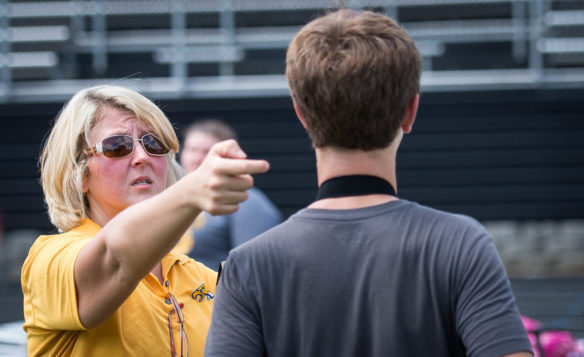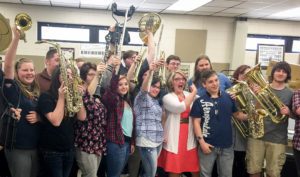
Martina Lutz, the director of bands at Johnson Central High School (Johnson County), directs marching band members into position during band camp at the school. Many of the Johnson Central band members are using new instruments thanks to country music star Chris Stapleton, a graduate of the school who headed a donation of $57,000 worth of musical instruments.
Photo by Bobby Ellis, July 19, 2016
By Mike Marsee
michael.marsee@education.ky.gov
The music program at Johnson Central High School was already on its way back when Chris Stapleton paid a visit to his alma mater.
Martina Lutz had spent four years trying to resuscitate a program that had shrunk in size and become an afterthought in its community. Nothing, however, gave the Johnson Central bands more of a shot in the arm – or Lutz more of a surprise – as the day in March when she and some of her students walked into her classroom and saw new instruments sitting there. Then Stapleton, one of the hottest stars in country music, walked into the room.
Stapleton presented a gift of $57,000 worth of musical instruments to the school where he was valedictorian of the class of 1996.
“It’s going to change the music program for years to come,” Lutz said. “Kids down the line will be saying, ‘I’m playing the tuba that Chris Stapleton donated.’”
Stapleton became one of the hottest names in music after winning two Country Music Association awards last year and two Grammy Awards earlier this year. Two days after the Grammys, he called Johnson Central Principal Russell Halsey to ask what he could do to help his former school – though Lutz didn’t find out about that until much later.
Lutz already had been working to change Johnson Central’s band program for the better. There were only about 20 students in the program when she took over as its director in 2012. Now there are about 100 students in grades 8-12 participating in a program that includes a marching band, concert band and a pep band, as well as stage jazz band and Advanced Placement music theory classes.
“The quality is getting stronger as opposed to just the quantity,” she said.

Members of the band at Johnson Central High School display their new instruments as director Martina Lutz, front row, center, points to country music star Chris Stapleton, a graduate of the school who headed a donation of $57,000 worth of instruments to his alma mater. The gift provided 28 new instruments and a line of drum carriers.
Photo submitted, March 24, 2016
Stapleton’s donation was made through ACM Lifting Lives, the charitable arm of the Academy of Country Music, and the Mr. Holland’s Opus Foundation, which provided some of the funding. The money bought 28 instruments and a line of drum carriers.
Lutz said only about 20 to 25 percent of her students typically use their own instruments, with the rest using instruments provided by the school.
Lutz had applied for a grant from the Mr. Holland’s Opus Foundation, which donates musical instruments to underfunded music programs, and was contacted for a wish list of items her program most desperately needed. But she never heard that the school had been selected for a grant until she walked into the band room and saw the new instruments.
“It was a complete surprise to me and the kids,” she said. “The reaction of the kids was wonderful. Some of them were quoted on TV saying, ‘We didn’t think people cared about us.’ It’s an amazing gift.”
Yet she said even that sizable donation isn’t enough to give the program everything she says it truly needs. For example, a campaign is underway to raise $10,000 to replace uniforms the school has used since the mid-1990s.
“In the grand scheme, it’s an amazing, amazing gift and a great start for us when all our instruments are falling apart, but really it’s a drop in the bucket,” Lutz said.
Music programs at many schools struggle for funding, and most don’t have a benefactor like Stapleton to help them. Her advice to those programs: Keep fighting for anything and everything you need.
“I’d tell them not to give up,” she said. “You’ve got to be resilient. You’ve got to refuse to give up. Don’t be afraid to ask for help over and over and over again. You’ve got to advocate for your program. You’ve got to be your biggest cheerleader.”
Kyle Lee, the coordinator of visual and performing arts for the Kentucky Department of Education, said leaders like Lutz who go the extra mile for their students raise the value of their programs.
“It is important for those leading programs that lack the necessary resources to function at the highest levels and create a quality opportunity for kids, to continue to forge partnership with local communities and businesses while searching out available resources to meet their programs’ needs,” Lee said. “Although typically viewed as duties outside of the job requirements, these small endeavors can help produce big changes in program capacity, thus offering students and those we serve quality opportunities to succeed beyond the program and into the future.”
Lutz said she and her students learned to make do, as students and band directors at so many schools have.
“We used a roll of duct tape, trying to get them repaired – not even in full working condition, but just so the kids could play them,” she said.
She said morale has been on the rise at Johnson Central as scores have risen in the Kentucky Music Educators Association regional marching band competitions during her four years. Last year, the drum line earned the school’s first distinguished rating in almost 20 years of KMEA membership.
“It was really hard to go into competition that first year and come in last place, but this year they’re actually beating bands,” Lutz said. “Just the fact that they’re earning awards has been a big deal for them. They’re starting to believe the harder they work, the better the results can be.”
She said the band is also starting to attract attention in the community.
“Before we were ignored, and I’ve had kids tell me they were pretty sure people could care less whether or not we showed up at a football game,” she said. “This year, some of the football players thanked us for showing up. Things like that mean a lot to the kids.”
So do role models like Stapleton, who was an accomplished songwriter and a successful musician more than a decade before his breakthrough as a solo artist.
“I’ve been using him as an example since I started at this school, and that was before he got big,” Lutz said.
Other role models are emerging as well. Lutz said there also are two recent alumnae currently studying music at Morehead State University, one of whom received a $25,000 scholarship to study clarinet.
Lutz is pleased that the band program is growing, but she said she also has stressed to her students how smaller bands can succeed, pointing to the perennially successful band at Hazard High School (Hazard Independent) and its longtime director Pauletta Smith, who is retiring this month.
“The goal is always to have large numbers, but at some point you want quality numbers. I’d rather have a program of kids who are really dedicated,” she said. “In a perfect world, it’s the popular thing to do and you get kids who try really hard, and we’re working toward that.”
MORE INFO …
Martina Lutz martina.lutz@johnson.kyschools.us



Leave A Comment